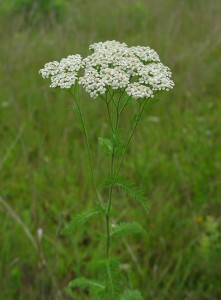Common Names: Milfoil
Overview: Popular in European folk medicine, yarrow or Milfoil (Achillea millefolium) has traditionally been used to treat wounds, menstrual ailments, and bleeding hemorrhoids. Its traditional uses also include the treatment of fevers and colds, and relief of stomach and intestinal upset. Legend has it that yarrow (Achillea millefolium) was named after Achilles, the Greek mythical figure who used it to stop the bleeding wounds of his soldiers.
Plant Description: Yarrow, a member of the Asteraceae family, is closely related to the chamomiles. It flourishes in a sunny and warm habitat, and is frequently found in meadows and along roadsides, as well as on dry, sunny slopes. It grows as a simple, erect, and hairy stem that can reach a height of 5 feet. The entire plant (with the exception of the fruit) is draped in white, silky hairs. Yarrow grows from runners as tough, angular, horizontal stems that bear flowers.
Yarrow blooms between June and September. The flowers are typically white, but either pink or pale purple flowers are common in mountain areas. The petals are densely arranged in flattened clusters, and the leaves look like feathers.
Parts Used: The whole herb, or above-ground parts, of the yarrow plant are used for medicinal purposes. This includes flowers, leaves, and stems. Yarrow grows in the wild and is collected for medicinal uses while it is in bloom.
Medicinal Uses and Indications: There has been very little research on yarrow’s medicinal properties. One study examining the effects of a three-herb mouthwash (yarrow, juniper, nettle) showed it to be ineffective in treating gum inflammation or the build-up of plaque. Even though there have been no studies focused uniquely on yarrow and how it affects people, clinical experience (and in some cases animal or laboratory studies) supports the use of yarrow for the following purposes:
Loss of appetite, Digestive complaints, To increase urine flow, Liver and gallbladder conditions, Menstrual irregularities, Menstrual cramps and pain, Muscle spasms, Inflammation, To fight infection, Fever (brings temperature down by promoting perspiration), To reduce bleeding, Wound healing.
Yarrow is available in the following forms: Dried or fresh herb, Capsules or tablets, Tinctures, Liquid extract.
How to Take It:
-Pediatric: Adjust the recommended adult dose to account for the child’s weight. Most herbal dosages for adults are calculated on the basis of a 150 lb (70 kg) adult. Therefore, if the child weighs 50 lb (20 to 25 kg), the appropriate dose of yarrow for this child would be 1/3 of the adult dosage.
-Adult: The following are recommended adult doses for yarrow:
Tea/infusion: three times per day (pour boiling water over 1 to 2 teaspoons of dried yarrow, steep for 3 to 5 minutes)
Dried herb: 2 to 4 grams in capsules, three times per day
Extract (1:1, 25% ethanol): 1 to 4 mL (20 to 120 drops) three times per day
Tincture (1:5; 40% ethanol): 2 to 4 mL (40 to 120 drops) three times per day
Sitz bath: 3 to 4 ounces (85 to 115 grams) of dried yarrow per 5 gallons (20 liters) of water
Precautions: The use of herbs is a time-honored approach to strengthening the body and treating disease. Herbs, however, contain active substances that can trigger side effects and interact with other herbs, supplements, or medications. For these reasons, herbs should be taken with care, under the supervision of a practitioner knowledgeable in the field of botanical medicine.
Contact with yarrow (the actual plant or cosmetic products made with yarrow) may trigger an allergic skin response in those who are allergic to plants in the Asteraceae species (feverfew, tansy, chamomile, chrysanthemums, ragweed, and echinacea). While there has not been adequate research to warrant declaring yarrow free of adverse effects, it appears to be safe when administered in recommended therapeutic doses. Pregnant women, however, should avoid its use because it may induce uterine bleeding and, possibly, a miscarriage. Those who are breastfeeding should use yarrow only in moderation.
Possible Interactions
There are no reports in the scientific literature to suggest that yarrow interacts with any conventional medications.
You can order dried yarrow from our catalog: shop.selibium-herbals.com .

 Български
Български
Leave a Reply to Makaila Cancel reply